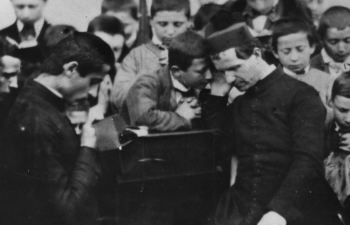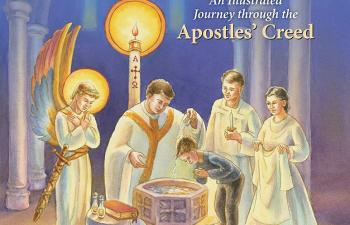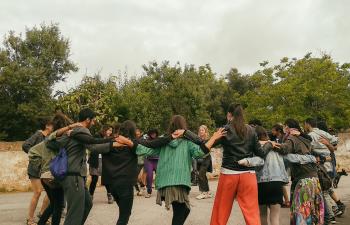
Catholics in the United States are currently engaged in a four-year process of reflection, evangelization, and consultation called the Fifth National Encuentro of Hispanic/Latino Ministry (from 2017 to 2020). At the core of this process is a catechetical model that builds upon the conviction that evangelization and catechesis must explicitly go hand in hand. The V Encuentro process will engage several million Catholics, directly and indirectly, in about 5,000 thousand parishes in most Catholic dioceses throughout the United States. The process is a perfect opportunity to assess to what extent the conceptual framework of the New Evangelization applied to catechesis can lead to a renewed appreciation of this important ecclesial activity in Catholic faith communities. At the same time, the process provides an occasion to take catechesis out of the “programmatic corner” where it dwells in many faith communities (e.g., pre-sacramental programs, “Sunday school”) and reposition it into a more integrated role in the Church’s wider evangelization efforts—a goal envisioned by most contemporary Church documents on catechesis but not always accomplished. In this essay, I propose that a community’s understanding of evangelization significantly influences how catechesis is conceived as well as the pedagogical and curricular commitments associated with it.
Catechesis and Evangelization
At the heart of the Church’s evangelizing activity is the conviction that the encounter with God through the mystery of Jesus Christ has radical implications for the lives of every human person. Christians proclaim with joy and enthusiasm that salvation is real, that partaking in God’s fullness of divine life in the here and now of our history—and beyond—is not just wishful thinking. Evangelization is ultimately the witness of the community of Christian disciples who have experienced the transforming power of God’s merciful love and, moved by the fire of the Holy Spirit in their hearts, desire others to do likewise. The Church “exists in order to evangelize”[i] and catechesis is a privileged activity to facilitate this experience. Catechetical leaders are most likely familiar with the stages of the process of evangelization. The General Directory for Catechesis summarizes them in the following way:
The process of evangelization, consequently, is structured in stages or “essential moments”: missionary activity directed toward non-believers and those who live in religious indifference; initial catechetical activity for those who choose the Gospel and for those who need to complete or modify their initiation; pastoral activity directed toward the Christian faithful of mature faith in the bosom of the Christian community.[ii]
It is vital to stress that catechesis is not just an isolated moment in this process (e.g., sacramental preparation), but it is intimately intertwined in all aspects and moments of the evangelization process. Catechesis is at the heart of the original proclamation, essential to prepare for Christian initiation, and vital to sustain the ongoing formation of the Christian disciple.[iii] Needless to say, evangelization relies significantly on good quality catechesis. To appreciate the evangelizing nature of catechesis, we need to have a good sense of what we mean when we say evangelization. Even though Catholics use the term on a regular basis, it is not surprising to encounter a wide array of interpretations. The point here is not to imply that there is only one way of speaking about evangelization but to affirm the timeless core principles when describing this important reality. The evangelizing experience is rich and abundant enough to inspire a significant number of appropriations. Yet we need to be attentive not to reduce evangelization to, say, mere indoctrination, a political agenda, or an exercise of pastoral maintenance.
Looking at Evangelization with Renewed Eyes
A community’s understanding of evangelization significantly influences its conception of catechesis as well as the pedagogical and curricular commitments associated with it. Pope Francis provides us with a compelling framework to speak about evangelization in his Apostolic Exhortation, The Joy of the Gospel. Three insights (of many more!) are worth highlighting for the sake of our discussion. First, evangelization is a joyful experience. Such joy is the result of a transforming encounter with the Lord: “The joy of the gospel fills the hearts and lives of all who encounter Jesus.”[iv] The joy of this encounter propels the Christian disciple to go to the encounter of others, to share what she has experienced. Second, evangelization has an intrinsic missionary character. When the Church evangelizes, it does it as a community of missionary disciples that go forth: “Each Christian and every community must discern the path that the Lord points out, but all of us are asked to obey his call to go forth from our own comfort zone in order to reach all the “peripheries” in need of the light of the Gospel.”[v] Third, evangelization demands that we enter into the lives of the people with whom we share the Good News, with words and actions. Evangelization is a deeply personal and relational experience: “To be evangelizers of souls, we need to develop a spiritual taste for being close to people’s lives and to discover that this is itself a source of greater joy.”[vi] Evangelization from this perspective challenges us to engage our sisters and brothers, regardless of their background, in the here and now of their existences, affirming their dignity as human beings and children of God, recognizing their potential to achieve fulfillment, and acknowledging the complexity of their lives. These characteristics of evangelization call for a catechesis that is joyful, missionary (i.e., that goes forth; unafraid of going to the peripheries), and profoundly relational. Catechesis must be an experience of encounter.
Catechesis as Encounter
We find ourselves with an invitation to creatively imagine a catechesis that is grounded in a double experience of encounter. On the one hand, we have the foundational encounter between God and humanity, within which the vocation of the Christian disciple is rooted and continuously discerned. On the other, we have the intentional encounter with our sisters and brothers in our own immediate contexts and realities, families, and faith communities—with particular attention to those who live in material and existential peripheries. Although we can envision catechesis as a helpful “means” to facilitate this double experience of encounter, the catechetical experience is much more! In other words, as an integral aspect of the evangelization process, catechesis needs to be more than just an “instrument” to facilitate encounter. Catechesis is in itself an experience of encounter. Something unique, profound, and transforming takes place in the catechetical experience. If catechesis as encounter is rooted in the dynamic understanding of evangelization just described, then we need a methodology that gives it life. Pope Francis names five moments that identify the evangelization process, which can be perfectly embraced as a methodological pathway for catechesis: “The Church which ‘goes forth’ is a community of missionary disciples who take the first step, who are involved and supportive, who bear fruit and rejoice.”[vii] The five moments are very clear: 1) take the first step, 2) get involved, 3) accompany, 4) bear fruit, and 5) rejoice! A catechesis intentionally incorporating these five moments has a unique potential to renew how we introduce Catholics, especially the younger generations, to the Good News and the richness and beauty of the Catholic Tradition. At the same time, it is a catechesis that summons Christians to genuinely and respectfully engage the experience of others as it unfolds in the complexity of the everyday. A catechesis that takes the first step demands that Christian disciples go out to encounter their sisters and brothers in the faith in the contexts of where they live instead of waiting for them to come to our churches or schools or catechetical programs. Taking the first step means that catechists need courage to go to places where people live and work to engage them in conversation about their faith. Catechists need to go to the corners of society where our young people spend their time, including those that we often ignore or dismiss because we find them threatening. Catechists need to be present in the complex and fast-changing world of social media. Catechists need to go to the neighborhoods and communities where millions of Catholic immigrants live. Catechists need to reach out to Catholics who drifted away or became disenchanted about their faith—and very often about the world and its institutions. Catechists need to go to the peripheries of Church and society where many find themselves abandoned, alone, forgotten, rejected. Taking the first step is an invitation to decentralize catechesis; that is, to go from one to multiple centers, to go where God’s people are and share the Good News with them. That first step is in itself an experience of encounter. Getting involved through the catechetical experience is about daring to ask our sisters and brothers how they are doing, to discover their sorrows and anxieties, their dreams and aspirations, and then helping them to connect these realities to the best of our Christian tradition. No one comes into the catechetical experience as a blank slate. We bring who we are: our cultural background, biases, struggles, experiences, values, etc. To get involved is a reminder that people come into the catechetical experience as flesh-and-blood persons, with real stories, with many questions, hoping with restless hearts to encounter the God of Revelation who understands who they are. So does the catechist. To speak of catechesis as encounter is to take seriously the experience of being human. God does. Catechesis as encounter is a unique opportunity to accompany our sisters and brothers on their life and faith journey. We need catechists who are true models of Christian accompaniment. The catechetical experience should introduce Catholics to the many ways in which God walks with us in history. Many examples in the Scriptures and Tradition illustrate this. As we catechize, people should experience the depth of God’s presence and love as we walk with them. Our U.S. society invests much on the idea of result-based educational efforts that can be measured. Such drive often permeates some of our catechetical efforts. Of course, accompaniment requires some expectations, yet we cannot fail to remember that faith is a lifelong journey. The catechist needs to be a companion without an unbending timeline. Catechesis is more than a mere program. The catechetical encounter compels the community of believers to affirm the potential of every baptized person to bear fruit in light of their identity and dignity as children of God. Catechists are to cultivate the seeds of the Word that God has planted in people’s hearts so they can bear fruits of new life, individually and communally. Catechists bear the responsibility to assist their sisters and brothers identifying their potential, discerning the charisms that the Spirit has given to them, and pointing to ways in which those gifts can bear fruit for the good of all. In essence, catechesis as encounter is a ministry of empowerment. When catechesis takes place in the material and existential peripheries that many people inhabit, empowerment becomes healing and restoration, a taste of the resurrection here and now. As the encounter with the Gospel engenders in the heart of the baptized person the desire to share the faith with joy, the catechetical experience is to inspire and encourage the celebration of such faith in the everyday. The liturgy remains the locus par excellence where the Christian community celebrates the joyful encounter with the Gospel. Thus, catechesis as encounter is intimately linked to the Church’s liturgical life. This drive to celebrate—certainly a sign of the presence of the Holy Spirit in the heart of the Christian person and in the community—is also expressed through popular Catholicism and other ways of ritualizing the Christian experience. Catechesis, then, is to cultivate the celebratory aspect of the faith as a way to actualize the joy of being missionary disciples.
Conclusion
Every period in the history of Christianity has called for approaches to evangelization that respond to the needs and realities of people in a particular place and time. The way communities define evangelization usually shapes how they conceive catechesis as well as the pedagogical and curricular commitments associated with it. In this article, I have briefly outlined an understanding of catechesis rooted in a vision of evangelization that is profoundly joyful, missionary, and relational. Much more needs to be said about it. Such catechesis implies a methodological pathway that involves five moments: 1) taking the first step, 2) getting involved, 3) accompanying, 4) bearing fruit, and 5) rejoicing. Each moment introduces a unique quality that underlines the potential of catechesis to shape the identity of the baptized to live and act as missionary disciples. These methodological presuppositions reveal not merely a catechesis that facilitate an encounter with God and with others, but a catechesis that is in itself an encounter. The implementation of this catechetical vision in Catholic faith communities engaged in the V Encuentro process throughout the United States will definitely test its feasibility and ideally stimulate further reflections about contemporary catechesis. In the context of a culturally diverse church and the rise of secularizing attitudes in our society, this is a much needed conversation. Hosffman Ospino, PhD is a professor of theology and religious education at Boston College, School of Theology and Ministry. He is a member of the leadership team for the Fifth National Encuentro of Hispanic/Latino Ministry. Email: [email protected]
Notes
This article is from The Catechetical Review (Online Edition ISSN 2379-6324) and may be copied for catechetical purposes only. It may not be reprinted in another published work without the permission of The Catechetical Review by contacting [email protected]



















